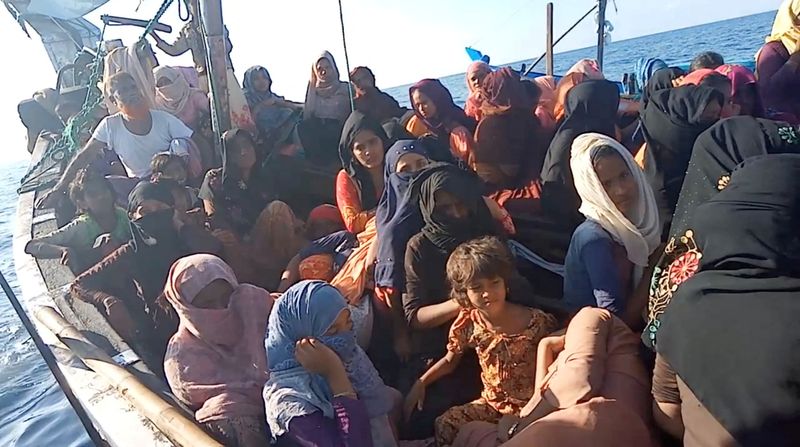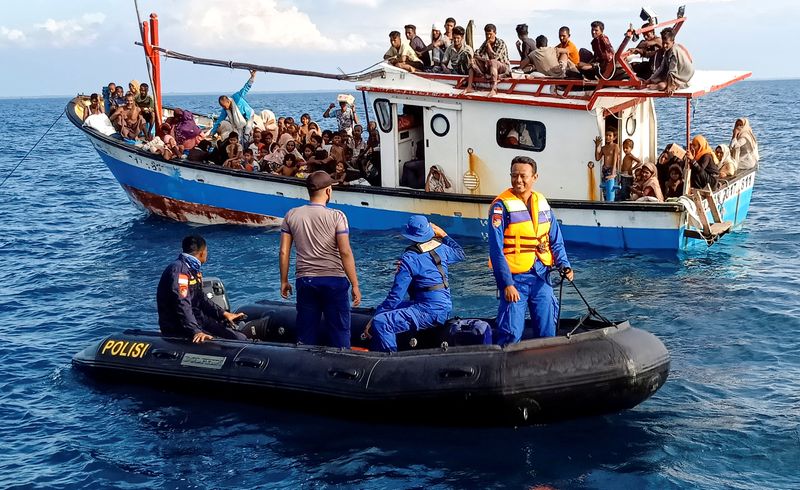By Krishna N. Das and Ruma Paul
NEW DELHI/DHAKA (Reuters) -The possible sinking of a boat in recent weeks with 180 Rohingya Muslims on board could make 2022 one of the deadliest years at sea in almost a decade for the community, a U.N. agency said, as refugees try to flee desperate conditions in Bangladesh camps.
Nearly 1 million Rohingya from Myanmar are living in crowded facilities in Muslim-majority Bangladesh, including tens of thousands who fled their home country after its military conducted a deadly crackdown in 2017.
The number of Rohingya leaving Bangladesh in boats this year has jumped more than five-fold from a year earlier to nearly 2,400, rights groups estimate. It is not clear if the lifting of COVID restrictions in Southeast Asia, a favoured destination, has led to the rush of people.
In Buddhist-majority Myanmar, most Rohingya are denied citizenship and are seen as illegal immigrants from South Asia.
The United Nations High Commissioner for Refugees (UNHCR) said it feared that a boat that set sail at the end of November was missing, with all 180 on board presumed dead.
The UNHCR said the vessel may have started to crack in early December before losing contact. It added it was not clear where the boat started, but three Rohingya men, including one whose family were onboard, said it set off from Bangladesh.
Nearly 200 Rohingya were already feared dead or missing at sea this year. "We hope against hope that the 180 missing are still alive somewhere," said UNHCR spokesperson Babar Baloch.
Thai authorities said four women and one man were found floating near Thailand's Surin island and another woman at Similan islands and were rescued by fishermen. Authorities had not yet confirmed their identities.
A local fisherman told Reuters he and his crew had rescued people hanging onto a floating water tank.
UNHCR's Baloch said 2022 was one of the worst years for dead and missing after 2013 and 2014, when 900 and 700 Rohingya died or went missing in the Andaman Sea and the Bay of Bengal after inter-communal violence forced them to flee.
"LEFT TO DIE"
Sayedur Rahman, 38, who fled to Malaysia in 2012 from Myanmar, said his wife and three children were among the missing on the vessel.
"In 2017, my family came to Bangladesh to save their lives," Rahman said. "But they are now all gone ... I'm totally devastated... We Rohingya are left to die ... on the land, at sea. Everywhere."
Bangladesh has in the past arrested people smugglers. The densely populated country has also asked the international community to help ease the load of hosting so many refugees.
Chris Lewa, director of the Arakan Project that works to support the Rohingya, told Reuters that a boat that drifted for weeks after leaving Bangladesh carrying nearly 200 had landed in Indonesia's Aceh province on Monday evening.
Earlier this month, she said many people from the same boat may have died of hunger or thirst.
"It's outrageous that they were left adrift for nearly four weeks, either completely ignored without food and water or towed out towards Indonesia," Lewa said.
A local Indonesian disaster mitigation agency said there were 185 passengers who arrived in the district of Pidie in Aceh province on Monday evening.

Some 57 other Rohingya reached Aceh on Sunday after nearly a month adrift. Two other boats carrying a total of 230 Rohingya landed on the shores of Aceh last month, while this month, Sri Lanka's navy rescued 104 Rohingya.
"Life in the camp is full of uncertainties, there is no hope that they can go back home soon," said Mohammed Imran, a former Rohingya community leader who has returned to Bangladesh from Malaysia.
